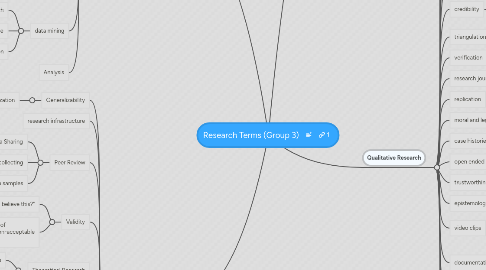
1. Scientific Research
1.1. Data Repositories
1.1.1. archiving data
1.1.1.1. making public
1.1.1.1.1. foundation of scientific researc
1.1.2. Technology to share data
1.2. Structured Abstracts
1.3. Methodological
1.3.1. validated measures
1.4. Empirical Work
1.4.1. Experimental
1.4.1.1. statistical
1.5. Standard of Ethics
1.5.1. explicit ethical standards for data sharing
1.5.1.1. I.R.B
1.5.1.2. example: APA, AAA and ASA
1.6. Structured Abstracts
1.6.1. Replicate
1.6.1.1. Reanalyza
1.6.1.1.1. Test
1.6.1.2. quality of evidence
1.7. positivistic
1.7.1. theoretical generalization
1.8. research journals
1.8.1. structured abstracts
1.9. quantitative
1.10. data mining
1.10.1. foundation of scientific research
1.10.2. accumulated knowlege
1.10.3. Generalization
1.11. Analysis
2. Shared Terms
2.1. Generalizability
2.1.1. Representational Generalization
2.1.1.1. Particularistic
2.1.1.1.1. Naturalistic
2.2. research infrastructure
2.3. Peer Review
2.3.1. Data Sharing
2.3.1.1. Confidentiality
2.3.1.1.1. Institutional Incentive Structures
2.3.2. data collecting
2.3.3. large, random representation in samples
2.4. Validity
2.4.1. "Why should I believe this?"
2.4.2. Boundary line of acceptable/non-acceptable research
2.5. Theoretical Research
2.5.1. Theoretical Generalization
2.5.2. standards of evidence
2.5.2.1. Documentation
2.5.2.1.1. Claims warranted by data
2.6. Patterns in data
2.6.1. provide new interpretations and theories
2.7. trustworthiness of inferences made from data
2.8. Interdisciplinary
2.9. Professional Development
2.10. research journals
2.11. replication
2.12. Structured Abstracts
2.12.1. meta-analyses
2.12.1.1. systematic reviews
2.13. Institutional Review Board (IRB)
2.13.1. Some studies are exempt
2.13.2. All studies involving human subjects
2.14. Inferential Generalization
2.15. Political Forces
2.15.1. Restrictive Standards
3. field notes, documents, transcriptions and artifacts
4. Qualitative Research
4.1. Heterogeneous
4.1.1. incorporates philosophies, theories, and research designs
4.1.2. Multiple communitities of practice and knowledge
4.2. Self-Correction (among researchers)
4.3. Account of Practice
4.4. A priori theory
4.5. Standardization
4.6. Rigor
4.7. Heuristic
4.8. credibility
4.8.1. incorporates diverse philosophies, theories, and research
4.9. triangulation
4.10. verification
4.11. research journals
4.12. replication
4.12.1. context affects results
4.13. moral and legal responsibilities
4.14. case histories
4.15. open ended interviews
4.16. trustworthiness
4.16.1. descriptive
4.17. epistemologies
4.18. video clips
4.18.1. Researcher as primary instrument of data collection.
4.18.1.1. interviews and personal observations
4.19. documentation
4.19.1. Non-random
4.19.1.1. theoretical
4.19.2. allows for ongoing contemplation
4.20. Claims
4.21. Small sample size
4.22. subjective
4.22.1. grounded
4.22.1.1. naturalistic
4.22.1.1.1. ethnographic,
4.23. Fieldwork
4.24. open and supple
4.25. qualitative data
4.25.1. rough materials collected in study
4.26. Interpretive Research
4.26.1. Describe what people do and say
4.27. Incorporate philosophies and theories
4.28. Account of Practice
4.28.1. descriptive work
4.29. Validity
4.29.1. inferences drawn from data
4.30. Evidence
4.30.1. field notes and observations
